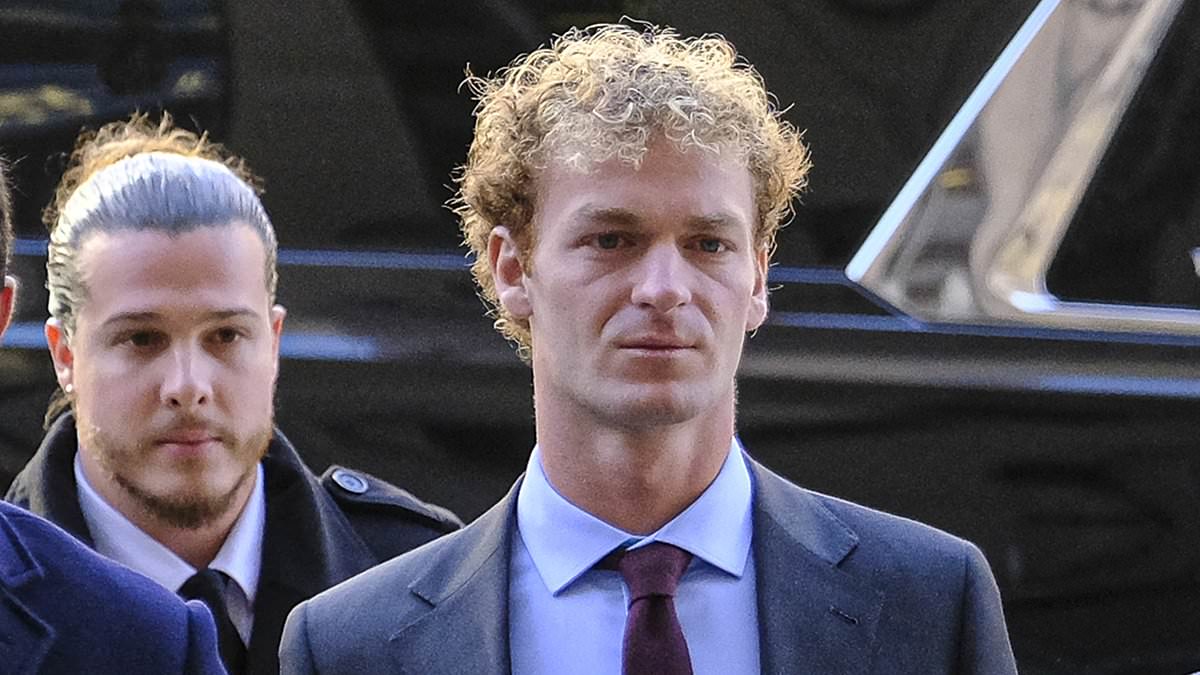Prosecutors on Monday are set to rest their case in Daniel Penny’s month-long trial for the death of homeless man Jordan Neely last year on a Manhattan subway.
Former Marine Penny, 26, claims he acted in self-defense and in defense of other passengers after Neely terrorized their subway car and threatened them, but prosecutors say he overstepped into vigilantism and criminally killed Neely with a chokehold.
Neely, 30, once was among the city’s corps of subway and street performers and was known for his Michael Jackson impersonations. He struggled with drug abuse and a mental illness and had a criminal record that included assault convictions.
Neely’s death on the subway car last spring sparked racial tensions in the Big Apple as groups such as Black Lives Matter sought to paint Penny as an overzealous, white ex-Marine targeting an innocent black man.
However, the national attention on the trial has also seen many conservatives question why Penny was even charged.
Penny is charged with manslaughter and criminally negligent homicide. He faces up to 15 years in prison.
The Prosecution’s Case
Prosecutors say Penny meant to protect people but recklessly used too much force, overlooking Neely’s humanity and making no effort to spare his life.
City medical examiners ruled that the chokehold killed Neely. However, a pathologist hired by Penny’s defense disputed that finding.
Prosecutors have noted the veteran continued to grip Neely’s neck after the train stopped and anyone who wanted to get out could do so, after bystanders urged Penny to let go, and even after Neely had been still for nearly a minute.
Multiple witnesses said Neely shouted about needing food and something to drink, whipped his jacket to the floor and said he didn’t care if he died or went to jail. They differed in descriptions of his movements and whether they were threatening. Several said they were alarmed by him and some were thankful when Penny subdued him.
A number of other passengers testified that they were scared of Neely and relieved that Penny grabbed hold of him.
A man who later stepped in and held down Neely’s arms, however, told jurors that he urged Penny to let go but that the veteran kept choking Neely for a time.
Prosecutors have painted Penny as unskilled, saying he improperly administered a choke for a duration that resulted in the victim’s death.
The Marine who trained Penny to apply a chokehold, Combat Instructor Joseph Caballer, conceded that video filmed by witnesses indicated his old cadet looked to have done so improperly.
Caballer testified that the video appeared to show Penny trying to use a ‘blood choke’ to restrain Neely – something he said should have seen him rendered unconscious within seconds.
Instead, the hold spanned more than six minutes.
During that time, Neely, while writhing in Penny’s arms, could have inadvertently turned the clench into an ‘air choke,’ which takes longer to render a person unconscious and could prove fatal much easier.
The hold is not taught by the Marines, he told jurors.
The Defense
The defense contends Penny held on because Neely tried to break loose at points and that the pressure on the man’s neck wasn’t consistent enough to kill him.
Dr. Satish Chundru, who was called to testify by Penny’s attorneys, blamed Neely’s death on a combination of a sickle cell crisis and the effects of schizophrenia and synthetic marijuana.
The former Miami-area medical examiner’s statement came in stark contrast to one delivered just days earlier, from the doctor who conducted the city’s autopsy.
Dr. Cynthia Harris had maintained it was neither drugs nor the victim’s genetic disorder that took Neely’s life, while also ruling out cardiac arrest.
During the trial, jurors watched videos recorded by bystanders and by police body cameras and saw how Penny explained his actions to officers on the scene and later in a stationhouse interview room.
‘I just wanted to keep him from getting to people,’ he told detectives, demonstrating the chokehold and describing Neely as ‘a crackhead’ who was ‘acting like a lunatic.’
‘I’m not trying to kill the guy,’ he insisted.
Penny did now take the stand in his own defense, with one of his lawyers noting that jurors did hear from Penny, in the form of his recorded statements to police minutes and hours after he put Neely in a chokehold.
‘Virtually everything he said then is consistent with credible testimony of his fellow passengers,’ Penny’s attorney Daniel Kenniff said.
Penny’s lawyers have said Neely lurched toward a woman with a small child and said, ‘I will kill.’
Dr. Alexander Bardey, a defense expert who reviewed Neely’s medical history, said on the stand he suffered severe schizophrenia for years, including believing dead rapper Tupac Shakur was ordering him to ‘change the world.’
Neely also suffered ‘paranoid fears that people want to hurt him,’ ‘grandiose delusions that people are jealous of him’, and reported hearing ‘the devil’s voice.’
Despite the shocking nature of Neely’s history, Manhattan prosecutors had sought to bar Bardey’s testimony from the trial, and attempted to have evidence of Neely’s mental illness and drug abuse withheld from Penny’s jury.
In his testimony, Bardey said he reviewed thousands of pages of Neely’s medical records dating back to 2015.
Bardey previously worked for Rikers Island jail, and witnesses said Neely was screaming about his willingness to return to the prison when he threatened subway passengers.
He said he had worked on hundreds of cases involving schizophrenia patients, and said Neel’s case was among the worst of his career.
‘His symptoms, I would classify as severe,’ Bardey testified.
‘He describes paranoid fears that people want to hurt him, grandiose delusions that people are jealous of him, said that Tupac instructed him to change the world, and that’s what he was doing.’
